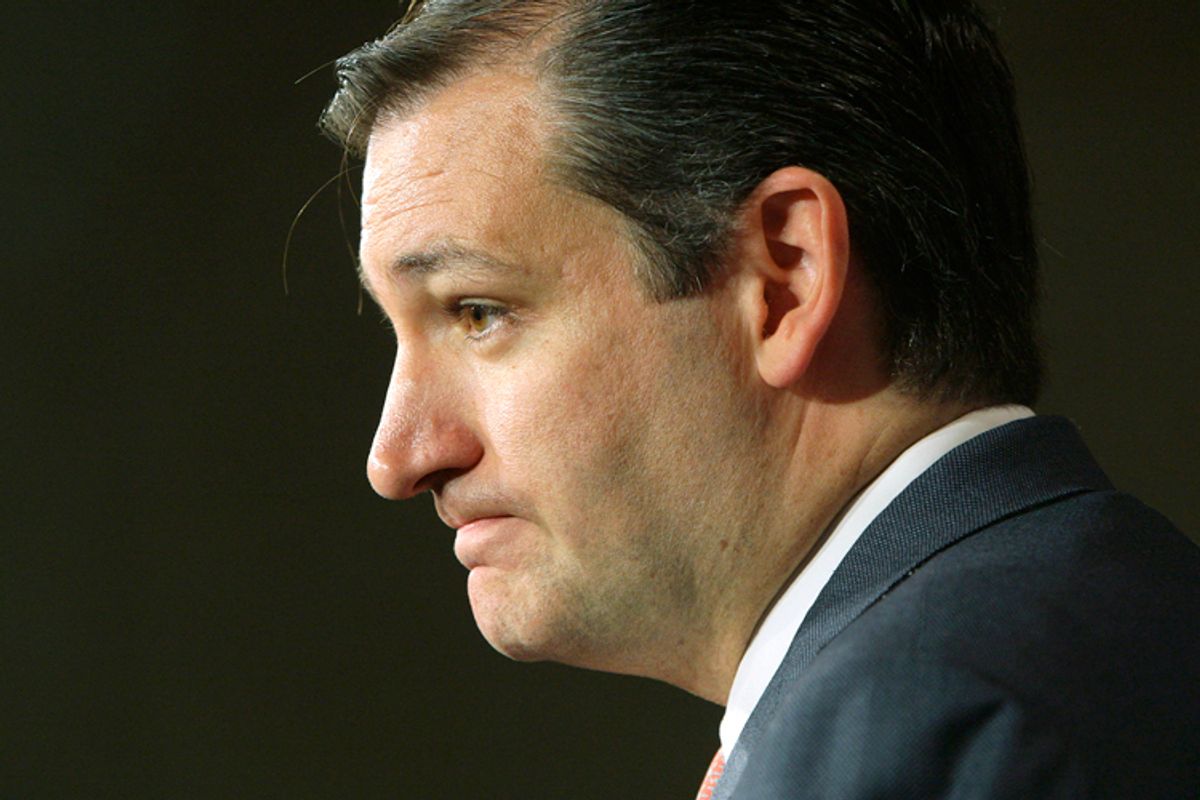On Friday, while pretty much everyone in the national press corps was hypnotized by CPAC's Grand Kabuki, Republicans quietly announced the biggest domestic political news of the week, and nobody wearing a tricorn hat was any the wiser, or there would've been hell to pay.
Politico's Jennifer Haberkorn got the scoop, which is behind a paywall, but here is the gist:
House Republican leaders are planning to bring up three changes to Obamacare next week — but unlike dozens of prior bills, these are more minor measures that are not expected to be controversial. All three bills essentially fix drafting errors, perceived oversights or unintended consequences in the president’s Affordable Care Act. They have bipartisan support and are scheduled to be considered under a suspension of the rules, which limits debate and requires support from two-thirds of House members — a signal that leaders of both parties do not expect any heated debate.
They hold some political significance, however, because they allow Republicans to push back against the Democrats’ talking point that the GOP is only interested in holding votes to pick at Obamacare’s flaws. They also represent the reality that Obamacare is now fully implemented — and not fixing errors could be more damaging to opponents than being perceived as trying to make Obamacare work better.
That pretty much covers it, though I would add that passing even a single Affordable Care Act technical corrections bills undermines the impression many conservatives are trying to create that the law is unfixable. These bills won't codify any of the administrative measures President Obama has taken to smooth implementation of the law, and instead will address the narrow concerns of worthy constituencies like veterans and Christian Scientists.
But the very existence of the bills carries significant implications for both President Obama and the Republican Party, and those implications cut against each other in interesting ways. Let's take them in order.
If you've followed the implementation of the Affordable Care Act closely, you're familiar with the ritual that accompanies each announcement of an administrative tweak or delay. First Republicans mock Obama and Democrats, "here we go again"-style; then they argue, irrespective of the merits, that said tweak or delay is evidence that the entire law is a #trainwreck; and finally they insinuate not-so-subtly that if Obama can use his executive powers to delay parts of the law in the service of smoother implementation, then a future Republican president can just stop enforcing the whole thing, full stop.
Writing at the Incidental Economist, administrative law expert Nicholas Bagley gently lends some credence to that argument. Bagley has examined the administration's legal reasoning for several of the measures and found some of them wanting. He worries about the precedent Obama is setting.
The lack of a persuasive legal justification matters most not for the current political battles, but for the future. Because the Constitution doesn’t crisply detail what the “take Care” clause means, the phrase accrues meaning through practice. The Obama administration’s repeated delays of the ACA now stand as precedent for future administrations that would also like to postpone statutes. The more the administration delays the ACA, the firmer that precedent becomes.
There’s a risk, then, that the delays will transfer to the executive branch considerable power to refashion statutes. That could spell trouble for health-care reform down the line. What if a future president were to postpone portions of the law that were essential to the law’s ongoing success? Or provisions that protected consumers from sharp insurance practices? The recent delays might give him legal cover to do so.
The point is well taken, though I would argue that an accretion of power to the executive is the inescapable consequence of the legislature's difficulty with divided government at a historical moment when the political parties are fully polarized. If power can't be exercised in the legislature it will naturally flow elsewhere. And that would be true under a Republican president and a Democratic Senate in 2017, even if Obama had never used an iota of executive discretion to smooth the implementation of Obamacare.
Still, the fact that Republicans are now issuing a handful of legislative technical corrections weakens Obama's argument that his ACA tweaks are sui generis -- an unfortunate, but necessary consequence of GOP-induced legislative gridlock -- and that in turn strengthen's the GOP claim that Obama is creating the precedent his successor might use to undermine the law. If Obama is changing the law unilaterally, irrespective of Congress' ability to do it lawfully, then President Cruz can do the same, without regard to the will of Congress.
But at the same time this week's technical corrections bills reflect the unsustainable nature of the Republican Party's official position on the law. These are minor tweaks, and in fact seem intended to create the illusion of broader cooperation, without remedying anything that will improve the law's systemic functioning. But they could also mark the initiation of a virtuous cycle. When the campaign to repeal the law failed, the backup plan was to stubbornly refuse to assist in its implementation in any way -- to facilitate the erosion of public support for the law, defeat Democrats at the polls, and weaken the coalition that beat back the repealers. But if that strategy is also unsustainable -- if "keep and fix" is the approach the public demands -- then over time more negatively impacted constituencies will have their concerns addressed and opposition to the law will weaken.
But that more or less moots the GOP's veiled threat to damage Obamacare by fiat in 2017.
If Republicans are indeed awakening to the dangers of exacerbating the law's problems, and willing to address some of them, they will face growing pressure to fix others. And by the time a Republican becomes president again, he will have much less incentive to undermine the law than today's Republicans are projecting.

Shares